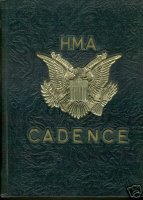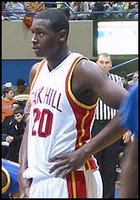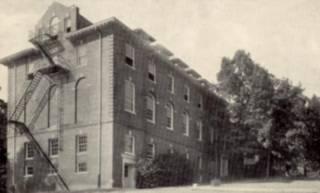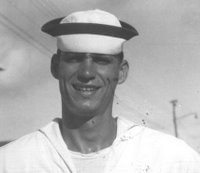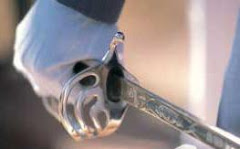 photo courtesy of Marketa Ebert
photo courtesy of Marketa Eberts an honor guard performed the burial of Army Pfc. Justin Davis, his mother Paula could not help but think that this is what her son would have wanted.
"He always wanted to be a hero," said Paula Davis. Friends and family say Justin was certainly that as he was laid to rest at Arlington National Cemetery in front of more than 100 friends and family Monday.
Justin, a 2005 graduate of Magruder High School, died June 25 while on patrol with the 10th Mountain Division in the Korengal Outpost in the eastern Kunar province in Afghanistan, where he had been since March. He was awarded the Purple Heart for being wounded in battle and a Bronze Star, both of which were given to his family Monday.
Before the burial at Arlington, close to 600 people attended Justin's funeral service at the Interdenominational Church of God in Gaithersburg Saturday. Almost every speaker called Justin a hero.
"Justin did something most people won't do," said Pastor Randy Dennis of Lakewood Church of God in Germantown. "He went off to fight and die for our country."
As Joseph "Jo-Jo" Holland started to speak, he took a step back to collect himself and was immediately consoled by several members of the crowd. Holland talked about plans he and Davis had made to go to Los Angeles after graduation to pursue acting careers.
"I'm out there now, doing it for him," Holland said. "He's a cool dude, and I love him."
Pastor Leon Grant of Mt. Calvary Baptist Church in Rockville, where Justin was an active member, said, "Justin was a hero to us all, and his was not in vain."
Barry Moultrie, a family friend who said that Justin was "like a surrogate son," said that while Justin did not die in vain, his should give policymakers in Washington pause to consider bringing the rest our kids home to prevent further needless loss of life.
Justin's is under investigation by the military as a possible friendly fire incident. Army Spokesman Maj. Nathan Banks said Davis was killed by "indirect fire," which is a term often used for mortar attacks, but no other information has been released. So far 17 soldiers have died in Afghanistan and Iraq due to friendly fire.
Paula said that no matter how her son died, the circumstances of Justin's are not important to her. What matters, she said, is that Justin was destined to be a soldier, and he was able to fulfill that destiny.
"You could see it when he was a little boy," said Paula. "He was always intrigued with action figures, GI Joes, that kind of thing."
Justin's interest in the military peaked when he attended Hargrave Military Academy in Chatham, Va., during his junior year of high school, where many of his teachers were retired officers. When Justin came back to Magruder for his senior year, it was clear to everyone that he had made up his mind to join the military.
"He was always adamant about joining the armed forces and serving his country, but when he came back from Hargrave, you could see the difference in him," said Ed Ashwell, Justin's football coach at Magruder. "He went from being a boy to being a man, saying 'Yes sir, yes ma'am,' those kinds of things. It fit him to a T."
Paula said she tried to convince her son not to join the military because of the conflict in the Middle East, but she said Justin would not be dissuaded.
"He was my only son," she said, " and I reminded him of that. You know what he told me? 'Mom, you should have had more kids.'"
Paula was adamant about Justin going to college and said she always made sure Justin knew he had options.
"He knew that if I had to work three jobs I would have done it, and that he didn't have to go into the military," she said. "But he told me, 'Mom, I still want to go to college, I just have to do this first.'"
She remembers one night in particular when Justin made her sit down with him and watch a show on television about the Army Rangers.
"I went out and bought him an Army Rangers shirt the next day, and he was wearing that to school, around the neighborhood, and even when he was working out trying to get his weight down for basic training," Paula said. "I knew I had to let him go and give him my blessing. I could have begged him to stay, and he probably would have."
"I asked him once, 'Why don't you just wait a little bit?' He said, 'Wait for what, mom, I have to get on with my life,'" she said.
Justin was assigned to Fort Drum, N.Y., after graduation, where he was a member of the Alpha Company of the 1st Battalion, 32nd Infantry Regiment, 10th Mountain Division. When his unit was assigned to Afghanistan, Justin was excited to go.
"He felt like this was his calling, that he could do some good," said Paula. "This encompassed everything that he was, from his young days playing with GI Joes up through Hargrave and his last year at Magruder. It was who he was."
"He died doing what he wanted to do," said Ashwell. "How many of us are going to be able to say that?"
By Josh BowmanMontgomery County Sentinel

